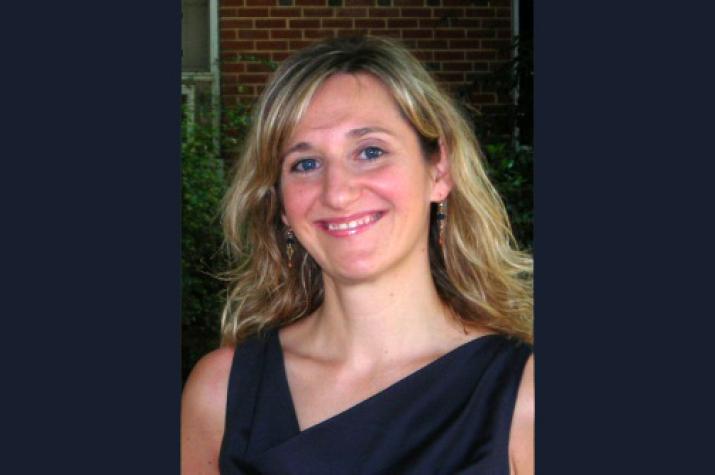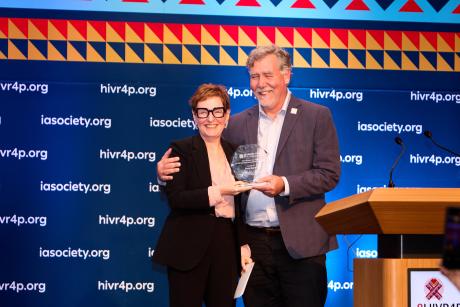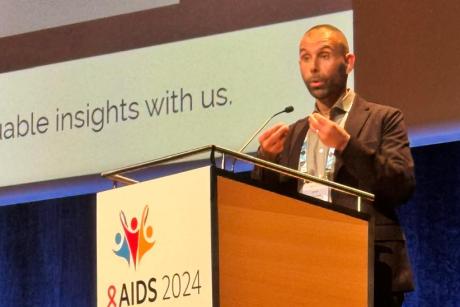A passion for combating HIV/AIDS and promoting health among the underserved are the key reasons why Nina Yamanis chose to pursue a career in global health. This fall, she joined the Duke community as the newest member of the Duke Global Health Institute’s Postdoctoral Fellowship Program.
Yamanis received a bachelor’s degree in Psychology, a master’s degree in Public Health and a doctorate in Health Behavior and Health Education from the University of North Carolina at Chapel Hill. As a graduate student, she developed a prominent speaker series to raise awareness about global HIV/AIDS on campus. Yamanis also led a service committee that developed four educational programs on global health topics, including HIV, and delivered them to middle and high school students throughout North Carolina.
It was through these experiences and her work with at-risk populations in Mexico and Tanzania, that Yamanis developed a special interest in the social factors that put underserved communities at risk for disease. “I just started thinking more and more that I wanted to do something in prevention, instead of after a crisis happens,” said Yamanis.
Yamanis completed her dissertation on the influence of social venues on HIV risk behavior and the prevalence of concurrent partnerships among young men in Dar es Salaam, Tanzania. Yamanis and her research team conducted structured interviews with 671 men to assess their concurrent partnerships and 50 interviews with young men at so-called “camps,” which are places where men socialize every day.
Her research found these camps to be stable venues where men have an organized membership and leadership as well as written camp goals. Camp members have strong social bonds and engage in income-generating activities with their fellow camp members. However, the camps are also venues where men meet new sexual partners, including commercial sex workers, and sometimes they have sex in the camps at night. Yamanis’ research shows that half of all sexually active men engaged in at least one concurrent partnership in the last six months. Men who reported symptoms of sexually transmitted infections were twice as likely to have engaged in a concurrent partnership as those who reported no symptoms.
Yamanis said it was critical to obtain data from young men, many of whom do not attend school or have a job, since this segment of the population is often overlooked by HIV prevention programs and may be more open to changing their risky behaviors than older men. “Young men are just beginning to develop their sexual behaviors, and it is a good time to target them for interventions,” said Yamanis, whose work at the Duke Global Health Institute will include the development of an intervention for these young males.
Her new project through DGHI will also examine the extent to which camps influence the men’s ideas and attitudes about concurrent sexual partnerships and risks for HIV/AIDS. “The camp leaders reported trying to influence the camp members to engage in less risky behaviors,” said Yamanis. “So, I plan to look more into that leader-member relationship and see if it can be harnessed to hopefully influence the men in a positive way.” Yamanis said that may require training for camp leaders to deliver better HIV prevention messages to young men.
“Nina’s research focuses on one of the most critical health care issues of our generation and centers on a severely underserved population,” said Jen’nan Read, Director of the DGHI Postdoctoral Fellowship Program. “Yamanis brings unique methodological skills and innovative approaches to studying pressing global health problems, and is a welcome addition to the growing postdoctoral program at DGHI.”
Yamanis’ mentors will be Giovanna Merli, DGHI faculty member and Associate Professor of Public Policy and Sociology; and Kim Blankenship, lead faculty member of DGHI’s “Gender, Poverty and Health” signature research initiative.
Yamanis is the third member of DGHI’s Postdoctoral Fellowship Program, which is in its second year. She said she is excited to join DGHI because it’s on the “cutting edge of global health. The institute is pushing the envelope of what is considered global health while training young people and developing competencies for it.”
As a behavioral social scientist who relies on the work of many disciplines, Yamanis said she’s also impressed by DGHI’s interdisciplinary focus.
*Learn more about DGHI’s Postdoctoral Fellowship Program.



